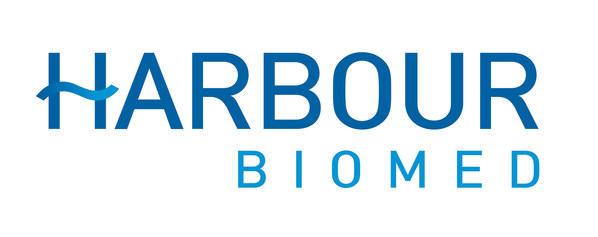 |
CAMBRIDGE, Mass. and ROTTERDAM, Netherlands and SUZHOU, China, Jan. 4, 2022 /PRNewswire/ -- Harbour BioMed ("HBM", HKEX: 02142) announced that, its next generation anti-CTLA-4 fully human heavy-chain only antibody (HCAb), HBM4003, has completed the first dosing of first patient in two phase I trials for the treatment of advanced hepatocellular carcinoma (HCC) and other solid tumors, as well as the treatment of advanced neuroendocrine tumor/neuroendocrine carcinoma (NET/NEC) and other solid tumors. These clinical studies aim to assess the safety, tolerability, pharmacokinetics/pharmacodynamics, and preliminary efficacy of HBM4003 in combination with toripalimab (PD-1 antibody) in patients with HCC, NET/NEC and other solid tumors.
HBM4003 has already received an IND approval from the U.S. FDA, IND approvals from the China NMPA and the clinical trial approval from the Australia Institutional Review Board (IRB). The Company is proceeding multiple clinical trials for HBM4003 monotherapy and combination therapy across the world. HCC and NET/NEC are among the first wave of such indications.
About HBM4003
HBM4003 is a fully human anti-CTLA-4 monoclonal heavy chain only antibody (HCAb) generated from Harbour Mice®. By enhancing antibody-dependent cell cytotoxicity (ADCC) killing activity, HBM4003 has demonstrated significantly improved depletion specific to high CTLA-4 Treg cells in tumor tissues. The potent anti-tumor efficacy and differentiated pharmacokinetics with durable pharmacodynamic effect presents a favorable product profile. This novel and differentiated mechanism of action has the potential to improve efficacy while significantly reducing the toxicity of the drug in monotherapy and combo-therapy.
About Hepatocellular Carcinoma (HCC)
Liver cancers are the fourth most common cause of cancer-related death and rank sixth in terms of incident cases worldwide. On the basis of annual projections, the World Health Organization estimates that more than 1 million patients will die from liver cancer in 2030.1 Hepatocellular carcinoma (HCC)2 is the most common form of liver cancer and accounts for ~90% of cases. The majority of HCC occur in patients with underlying liver diseases, mostly as results of hepatitis B or C virus (HBV or HCV) infection or alcohol abuse. Systemic therapies are recommended for advanced stage of HCC, including inhibitors of multiple kinases and immune-based therapies, with increased median survival of 10.6~15.6 months.1 Although the clinical management of advanced stage of HCC has improved in the past 10 years, there is still high unmet medical needs to explore new, effective and life-prolonged therapies for HCC.
About Neuroendocrine Neoplasms (NEN, including NET and NEC)
NEN is a neoplasm that arise from neuroendocrine cells. There are two fundamentally different groups of NEN: well-differentiated, low-proliferating NEN, called neuroendocrine tumor (NET) and poorly differentiated, highly proliferating NEN, called neuroendocrine carcinoma (NEC). NEN can occur almost everywhere in the body but are most common in the gastrointestinal tract, the pancreas, and the lungs.3 Surgery, radiation therapy, chemotherapy and a variety of drug treatments are common therapies for patients with NET/NEC. Prognosis is worse in metastatic tumors, with the 5-year survival rate about 4.7% in metastatic gastroenteropancreatic neuroendocrine cancer (GEP-NEC).4 Consequently, there is still high unmet medical needs to explore new, effective and convenient therapies for NET/NEC.
About Harbour BioMed
Harbour BioMed (HKEX: 02142) is a global biopharmaceutical company committed to the discovery, development and commercialization of novel antibody therapeutics focusing on immunology and oncology. The Company is building its robust portfolio and differentiated pipeline through internal R&D capability, collaborations with co-discovery and co-development partners and select acquisitions.
The Company's proprietary antibody technology platforms Harbour Mice® generate fully human monoclonal antibodies in two heavy and two light chain (H2L2) format, as well as heavy chain only (HCAb) format. Building upon the HCAb antibodies, the HCAb-based immune cell engagers (HBICE®) are capable of delivering tumor killing effects unachievable by traditional combination therapies. Integrating Harbour Mice® with single B cell cloning platform, our antibody discovery engine is highly unique and efficient for development of next generation therapeutic antibodies.
References:
![]() View original content to download multimedia:https://www.prnewswire.com/news-releases/harbour-biomed-announces-dosing-of-first-patient-of-two-phase-i-trials-for-next-generation-anti-ctla-4-antibody-hbm4003-301453375.html
View original content to download multimedia:https://www.prnewswire.com/news-releases/harbour-biomed-announces-dosing-of-first-patient-of-two-phase-i-trials-for-next-generation-anti-ctla-4-antibody-hbm4003-301453375.html